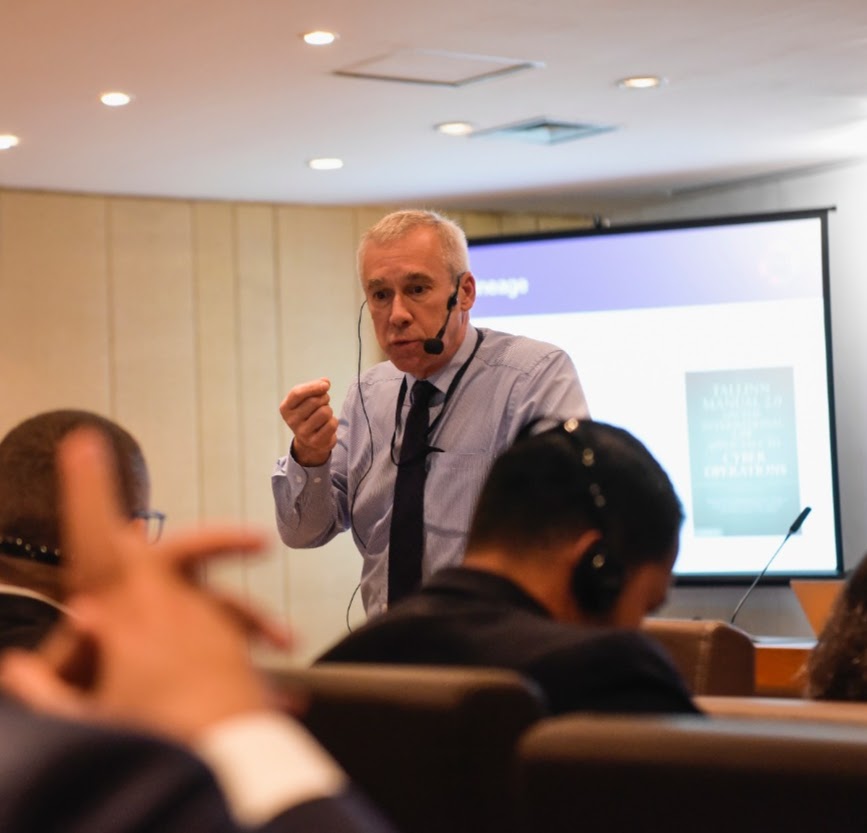
On 9th April, Professor Mike Schmitt spoke to students of the United States Naval War College on the legality of the United States’ strategy of “Persistent Engagement” in cyberspace. According to the strategy, the U.S. will operate in other country’s cyberspace whenever necessary to prevent, and respond to, hostile cyber operations mounted by those countries or by others countries or groups from or through their territory. The legality of the operations, according to Professor Schmitt, depends on the nature of the cyber operations to which they respond, the identity of the attacker, and the type and severity of the U.S. cyber response.
 The Naval War College provides post graduate education in national security and strategic affairs for mid-career and senior officers and senior government civilians from the United States and other nations. It is home to the Stockton Center for International Law, widely recognised as the world’s premier think tank in operational law. Professor Schmitt is the former Chairman of the Stockton Center and currently Professor Emeritus at the College.
The Naval War College provides post graduate education in national security and strategic affairs for mid-career and senior officers and senior government civilians from the United States and other nations. It is home to the Stockton Center for International Law, widely recognised as the world’s premier think tank in operational law. Professor Schmitt is the former Chairman of the Stockton Center and currently Professor Emeritus at the College.


 The University of Reading Law School now offers an Executive Education in International Cyber Law program for government officials from around the world. The week-long seminars, which are led by Professor Mike Schmitt (who recently joined the Law School), explore how international law applies in the cyber context during both peace and war. They are designed to equip officials to both deal with major cyber incidents and develop their own national legal policies and strategies. Participants come from ministries of foreign affairs and defence, attorney general offices, the armed forces, law enforcement agencies, and cyber agencies.
The University of Reading Law School now offers an Executive Education in International Cyber Law program for government officials from around the world. The week-long seminars, which are led by Professor Mike Schmitt (who recently joined the Law School), explore how international law applies in the cyber context during both peace and war. They are designed to equip officials to both deal with major cyber incidents and develop their own national legal policies and strategies. Participants come from ministries of foreign affairs and defence, attorney general offices, the armed forces, law enforcement agencies, and cyber agencies. These seminars are sponsored by the governments of the Netherlands, Australia, Singapore, United States, Canada, and United Kingdom, as well as the Organization of American States and Organization for Security and Cooperation in Europe. Most are regionally oriented so as to facilitate cooperative responses to hostile cyber operations from States and non-State actors. This year, depending on travel restrictions, the program will be offered in Vietnam, Singapore, Fiji, Austria, Albania, Germany, Argentina, Peru and a number of “to be determined” locations.
These seminars are sponsored by the governments of the Netherlands, Australia, Singapore, United States, Canada, and United Kingdom, as well as the Organization of American States and Organization for Security and Cooperation in Europe. Most are regionally oriented so as to facilitate cooperative responses to hostile cyber operations from States and non-State actors. This year, depending on travel restrictions, the program will be offered in Vietnam, Singapore, Fiji, Austria, Albania, Germany, Argentina, Peru and a number of “to be determined” locations.